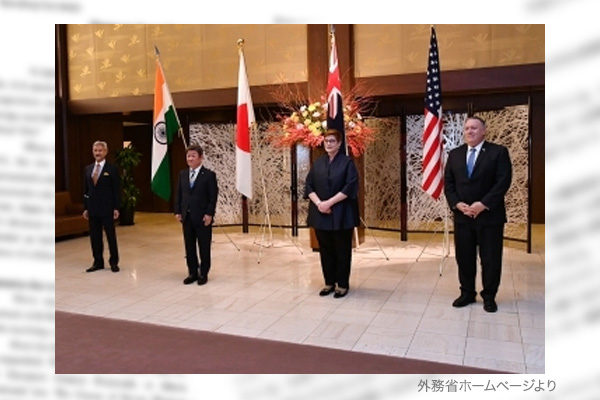The 2nd ministerial meeting of the Quad group of countries hosted by Japan in Tokyo on 6th October 2020 was significant. The Foreign Ministers of India, Australia and the US Secretary of State flew specially to Tokyo for a face-to-face meeting, ignoring the covid crisis. Unlike the earlier meeting which was held in November 2019, this meeting was a stand-alone meeting and not a meeting held on the margins of a larger meeting.
There was a great deal of interest in India in the Tokyo meeting in the backdrop of the continuing military stand-off between India and China on the Line of Actual Control (LAC) in Ladakh. Despite the Jaishankar-Wang Yi meeting in Moscow last month and several rounds of corps commander level talks, the tense stand-off continues amongst rising tensions between the two countries.
Like before, the Quad ministers did not issue a common joint statement, preferring instead to issue separate country statements. This indicates certain hesitation and caution on behalf of the foreign ministers to explicitly define the Quad’s objectives. Except for the US, no other minister mentioned China by name in their public statements.
Nervous China
The Indian External Affairs Minister’s statement was couched in standard formulations. i.e. commitment to “maintaining a free, open and inclusive Indo-Pacific…upholding the rules-based international order, underpinned by the rule of law, transparency, freedom of navigation in the international seas, respect for territorial integrity and sovereignty and peaceful resolution of disputes.” China routinely violates these principles. Therefore, there was an indirect message to China in the Indian statement without it being mentioned by name.
Although China has been dismissive of the Quad, it is extremely uncomfortable and has not hidden its displeasure on the Quad meeting. Articles in the Chinese media have begun to compare Quad with NATO. China knows that the four members of the Quad have significantly greater economic, technological and military capabilities. There are also reasons to believe that in future, the Quad might engage with other countries. The prospect of Quad plus will be deeply unsettling for China.
India’s defence partnership with the US is growing rapidly. The two countries will be holding the ‘2+2’ dialogue at the defence and external affairs ministers’ level later this month. India is likely to sign with the US the all-important Basic Exchange and Cooperation Agreement (BECA) agreement which will further cement Indo-US defence ties. Defence cooperation with Japan is also proceeding well. India and Japan have recently signed an important logistics Acquisition and Cross Servicing Agreement (ACSA) which will further deepen the defence cooperation. Although, these activities are not directed against any specific country, China is watching the situation with some nervousness.
Devided opinion on Quad institutionalization
The opinion in India on whether the Quad should be institutionalised is divided. While there is support for the formalisation of the Quad, some observers feel there is also some merit in keeping the Quad a flexible arrangement so that each country can pursue its national interests without the need to follow an alliance discipline.
India is sensitive to maintaining an independent foreign policy and its strategic autonomy. Indian public opinion does not take kindly to the word military “alliance” but it does not mind strategic cooperation, filled with security content, with partner countries. The unpleasant consequence of China’s rise is making India cautiously overcome some of its hesitations of forging defence and security partnerships. India is aware of the positive potential of the Quad and favours its gradual evolution.
Arvind Gupta is Director, Vivekananda International Foundation, New Delhi.


